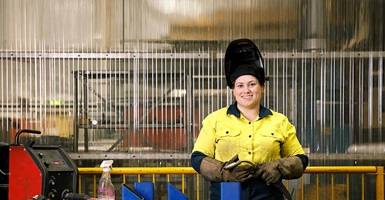Franck Poirier has had an exciting career as a patisserie chef, baker and cook which has allowed him to travel the world.
The Chisholm hospitality (patisserie) teacher worked in Europe, Africa, India and South America before settling in Australia and becoming a patisserie teacher at Chisholm.
Here, he shares his insight into what it takes to become a successful patisserie chef.
Why choose to work as a patisserie chef?
If you love baking, a patisserie course can open all sorts of pathways, says Franck. For example, you could work in a commercial kitchen as a Chef de Partie (a station chef); in a patisserie, bakery or café; or start your own business.
You could work on a cruise ship, in patisserie development for big compagnies or even represent Australia in a patisserie competition.
And in the current jobs market, there is plenty of work available for aspiring patisserie chefs. “At the moment in Australia, there’s a crisis with high demand in the industry because of COVID,” says Franck.
Another big drawcard is that as a patisserie chef, you can travel and broaden your skillset along the way. “I’ve travelled all over the world with this job,” says Franck. “The possibilities are endless.”
What attributes do patisserie chefs need?
To succeed as a patisserie chef, you need a good amount of passion and dedication, says Franck. You may have to work early starts or night shifts, and sometimes on weekends.
“I don’t think you work for money alone – you work for love,” says Franck. “If you have a qualification, you will earn more money compared to somebody with no qualification.”
A dash of creativity (for things like cake decorating), as well as an eye for detail are also important. “As a patisserie chef, you can create beautiful things,” says Franck. “You create your own flavour and brand, whether it’s with a cake, a pastry or with chocolate.”
Lastly, a measure of patience is a must with patisserie. You can’t hurry the process or ‘wing it’ with cake making and other baked goods. It’s a skill structured and calculated.
The good news is that even if these skills don’t come naturally to you, they can be taught through a patisserie course. “It takes a long time to become a good pastry chef,” says Franck. “By repeating things, you become better. Even I am still learning my craft – it’s a process every day.”
What is involved in being a patisserie chef?
Patisserie chefs make baked goods, which can include cakes, desserts, macarons, sandwiches, petits fours, pastries, chocolate, gateaux and yeast-based bakery products (like bread).
Tasks may include:
- Preparing and shaping dough
- Designing and testing new recipes
- Decorating baked goods
- Ordering ingredients and maintaining stock
- Ensuring your work environment is clean and safe.
Myths about patisserie
Patisserie only covers ‘French’ pastries
While the word ‘patisserie’ does traditionally describe French pastries and the pastry shops they are sold in, it is now used more broadly to encompass other influences from around the globe.
Chisholm’s Certificate III in Patisserie, for example, covers different desserts infused with Asian and middle eastern influence.
Patisserie is all about sweets
Patisserie encompasses sugar and spice and all things nice. When you study the Certificate III in Patisserie, you walk away with a good mix of skills relating to sweet and savoury delights.
The career pathways are limited
If you thought a patisserie course only opened one door – to a bakery – think again.
As mentioned, you could work in a commercial kitchen’s pastry department; in a patisserie, bakery or café; or be self-employed.
There are also fully qualified chefs who study patisserie in order to broaden their skillset.
Patisserie chef courses
The first step to becoming a patisserie chef is to get qualified with Chisholm’s Certificate III in Patisserie.
This patisserie course gives you all of the tools to not only make beautiful things, but also to run your own business on the side. It teaches you really handy skills, like how to make coffee, package foodstuffs for sale and plan and cost basic menus.
The course takes 9 months, 3 days per week.
“We have all different people studying patisserie – it’s very eclectic,” says Franck. “It ranges from young people to mature students aged in their 70s.”
What makes Chisholm a great choice for your patisserie studies
The course is designed to match industry standards and give students confidence after graduating. Patisserie students have the opportunity to sell their baked goods to staff and the public from Chisholm’s Patisserie 121 café at Dandenong campus.
“At the beginning of the course, the baked goods are not that great, but by the end of it, they look so much better,” says Franck. “It’s a great example of the evolution – the journey that students go through. “
Students can also enter various patisserie competitions to expand their skills and portfolio.
Patisserie chef job opportunities
The job opportunities for patisserie chefs are wide-ranging and there is massive demand for patisserie chefs at present.
With Chisholm’s nationally recognised Certificate III in Patisserie, you can work as a pastry chef in cafes, restaurants hotels or in your own business.
“Not a lot of chefs can do patisserie very well, so there are a lot of specialised jobs,” says Franck.
Tips for how to get started
Franck says if you can show prospective employers the following traits, you will be in the door in no time. You must be:
- On time and reliable
- Honest
- Willing to learn
- Well-presented
- Process-driven.
Patisserie chef salary
According to seek.com.au, the average annual salary for pastry chefs in Australia ranges from $60,000 to $70,000.
“The salary is better than it used to be because of the demand for pastry chefs,” says Franck. “At the end of the day, what you earn will depend on how good you are and how comfortable you are in your skin.”
Like to learn more about becoming a patisserie chef?
To find out more about patisserie courses in Melbourne, get in touch. Alternatively, browse Chisholm’s Certificate III in Patisserie course page.


